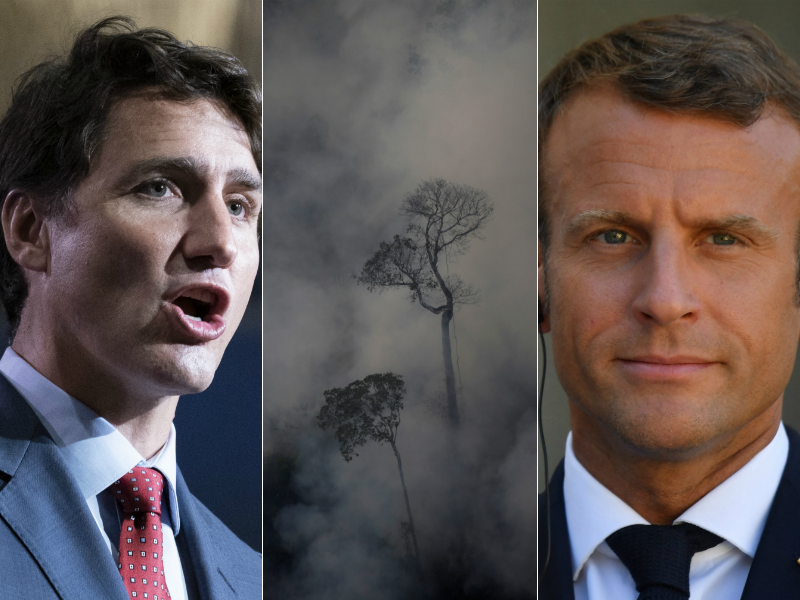The Amazon rainforest, often referred to as “the lungs of the planet,” has seen a record-setting wave of wildfires that sparked international outcry and led to mounting pressure against Brazil’s president over policies that have opened up the region to deforestation.

Brazil’s National Institute for Space Research (INPE) has recorded more than 74,000 fires so far this year – up 84 per cent from the same period in 2018 and the highest increase since records began in 2013.
WATCH: Why activists are blaming Brazil’s president over Amazon fires

NASA images show fires burning across parts of the southern Amazonas state and into the northern Rondonia state.
Researchers have said the implications of the fires are dire. The Amazon, which spans 5.5 million square kilometres, is one of the best tools in the fight against climate change as it accounts for roughly a quarter of the carbon dioxide absorbed by the world’s forests, according to a 2011 study.
“In the midst of the global climate crisis, we cannot afford more damage to a major source of oxygen and biodiversity. The Amazon must be protected,” UN Secretary-General António Guterres tweeted on Thursday.
Why is the Amazon burning?
Scientists have pointed to three main causes for the fires: deforestation, farming and drought.

Get breaking National news
“It is very difficult to have natural fires in the Amazon; it happens, but the majority come from the hand of humans,” Paulo Moutinho, co-founder of the Amazon Environmental Research Institute, told the Associated Press.
Moutinho, who has spent nearly 30 years working in the Amazon forests, said fires are mostly used to clean up vast areas of land for farming or logging.
The fires can easily get out of control — especially during the Amazon’s dry season, which runs from August to November — and spread to densely forested areas.
International outcry
Brazilian President Jair Bolsonaro has been widely criticized by global leaders for his handling of the Amazon, where his government has removed environmental protections to encourage agriculture and mining.
Bolsonaro has dismissed the criticism and suggested, without evidence, the fires were being set by NGOs fires in the Amazon as retribution for his administration’s reduction in their funding.
French President Emmanuel Macron and Canadian Prime Minister Justin Trudeau have spoken out against the fires, suggesting they should be brought up as urgent business at this weekend’s G7 summit in Biarritz, France.
READ MORE: Amazon wildfires — A look at what’s fact and what isn’t
On Friday, Macron threatened to block a European Union trade deal with South American states, including Brazil.
“Brazil these recent weeks show clearly that President Bolsonaro has decided to not respect his commitments on the climate, nor to involve himself on the issue of biodiversity,” Macron’s office said in a statement.
WATCH: Brazil’s Bolsonaro faces international criticism over fires
Bolsonaro responded by accusing Macron of seeking to make “personal political gains” over the issue.
“The sensationalist tone he used does nothing to solve the problem,” he said,
READ MORE: The deforestation of Brazil’s Amazon jumped by 88% last month
Meanwhile, federal prosecutors in the Amazon region launched investigations of increasing deforestation, according to local media. Prosecutors said they plan to probe possible negligence by the national government in the enforcement of environmental codes.
Speaking with reporters on Friday, Bolsonaro said he’s leaning toward sending the army to help fight Amazon fires that have alarmed people around the world.
How you can help

WATCH ABOVE: Protests over Amazon fires held outside Brazilian embassy in London
Several charities, including Rainforest Trust, One Tree Planted and the Nature Conservancy’s Plant a Billion Trees campaign, offer Canadians a way to invest directly in Amazon forests.
Donations to the Rainforest Action Network and the World Wildlife Fund work to protect the Amazonian rainforest and species found there.
Amazon Watch and the Amazon Conservation Team are organizations working to protect the rainforest, defend Indigenous rights and address climate change.
The Rainforest Alliance is calling on people around the world to buy rainforest-safe products and consume less food that may come from the rainforest, like beef or palm oil.
*With files from Rachael D’Amore and the Associated Press














Comments